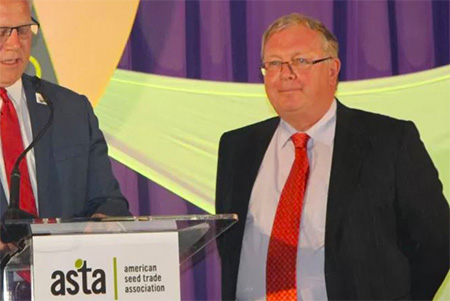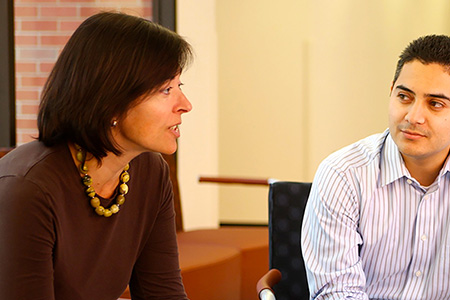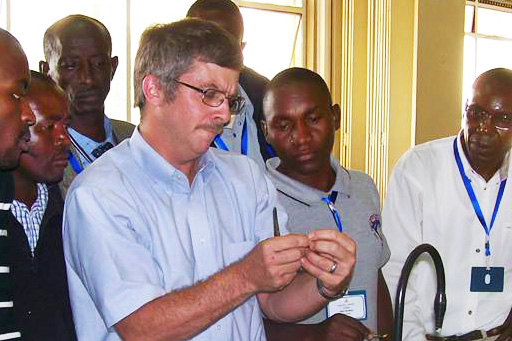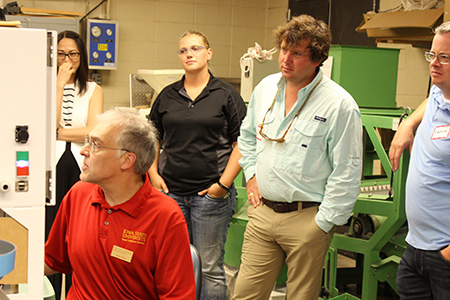Seed Business Management
Short Course Overview
The seed business is a competitive environment where farmer/customers want the best products possible so they can maximize their yields. The research organizations in crop genetics are responsible for the creation and development of these ever-improving products. With this responsibility comes decision making and execution on multi-million dollar budgets. In this course we will discuss how seed companies and crop genetics research organizations decide what to work on and how to go about executing on a plan to create products that will make our farmer/customers successful.
Leadership, Teamwork, Negotiation, and Social Influence
This course provides an applied overview of organizational leadership, teamwork, and negotiation with special emphasis on the ability to successfully influence in a variety of contexts. We will explore leadership, followership, and management as a process, including understanding the differences among them. This course is designed to be relevant to a broad spectrum of negotiation problems that are faced by managers and professionals in organizations. Additionally, team work and team building is integrated to better understand interdependent relationships and processes. The four modules in this class include:
- Teamwork Barriers and Breakthroughs
- Insights to Leadership, Followership, and Management
- Laws of Social Influence
- Negotiation and Conflict Resolution
Regulations, Policy & Trade:
We will discuss the global seed trade and the need for formal national seed laws as well as their enforcement. Other topics will include analysis tags, variety registration, and certification. An introduction to intellectual property protection and access to germplasm will be discussed. We will review the new global phytosanitary regulatory policy that has been approved and is currently being implemented. We will discuss how companies view seed treatments, how they are regulated, labeling, their phytosanitary role, and the stewardship guides available. We will do a high-level overview of GMO regulations and discuss their impact on the seed industry. The ISF Rules for Trade in Seed for companies contracting seed production will be presented. Throughout the discussion, we will be talking about the key stakeholder organizations that regulate or impact the global seed trade.
Intellectual Property:
Successful plant breeding mandates the most effective use of intellectual property protection to protect innovations and intellectual capital so as to encourage continued investments into research. IP is also essential to allow licensing of germplasm and technologies. Licensing is an essential component of plant breeding as no single organization can develop all the tools necessary to develop traits or to undertake research. The terms conditioning economic costs of accessing and using germplasm from genebanks have been discussed over the past several decades and are now beginning to be formalized. Germplasm diversity is a key raw material of plant breeding and by innovative research and product development can become even more of a potential competitive advantage. Knowledge of the regulatory environment to access germplasm and to help protect newly developed germplasm is ever more crucial. This session will include discussion concerning International Treaties (UPOV, WIPO, CBD, IT-PGRFA) and their interactions, along with forms of intellectual property protection available to plant breeders.
Why do customers buy? At first glance one may think they are buying a product or a service. But what they are really buying are beneficial outcomes. When a farmer or rancher buys a Ford F-150 pickup truck, she is certainly buying the ability to move things (bags of seed, tools, fencing materials), along with the assurance that comes from owning the #1 brand in the industry, the social approval that comes from staying within the Ford family, and maybe even the pleasure of hearing the exhaust rumble every time it starts. The full package of beneficial outcomes that come from a purchase is called the value proposition. All products have a value proposition that the company should manage, and that proposition is determined by many more factors than miles per gallon for a pickup truck or projected yield-per-acre for a corn hybrid. The business-to-business (B2B) marketing session will explore the different dimensions of value, with an eye towards identifying action that companies, large and small, can take to have value propositions that are defensible and sustainable. Topics such as market segmentation, brand management, and relationship management will be discussed.
The seed industry has experienced tremendous SKU proliferation over the past 2 decades. This means conditioning and managing many types of green seed, and even more finished bags or totes of seed. During this course, we will explore supply chain management in the evolving seed industry. In particular, we will explore the integration of supply (conditioned seed) and demand (true on-farm use) and the uncertainty that encompasses the chain. A strong channel to serve the end customer is critical, but high customer service comes at a high cost! Leave this session with a few tools and some thought-provoking ideas on managing inventory and potential out-of-stock situations.
The Business Strategy module will examine how the external environment in concert with company resources define the boundaries of business strategy. The session will use traditional frameworks to consider the questions of: (1) what is a business strategy? (2) How do you build and implement one?
The finance module will include topics selected from the following: financial statement and ratio analysis, capital budgeting and project evaluation, cost of capital, the capital raising process and instruments, and mergers and acquisitions.
Week At A Glance: Dates: TBD
(Schedule is subject to modifications)
Date: TBD
| 7:30-8 am | Shuttle from Best Western Hotel to Seed Science Center (SSC) |
| 8-8:15 am | Check-in and Registration, Room 106 SSC |
| Welcome & Course Overview | |
| Guest Presenter | |
| Research Management | |
| 12-1:00 pm | Lunch provided (SSC) |
| Research Management | |
| Laws of Social Influence | |
| 5:30-7 pm | Social Networking Hour transportation, food, and beverages provided |
| 7:00 pm | Shuttle from Social Hour to Best Western Hotel |
Date: TBD
| 7:30-8 am | Shuttle from Best Western Hotel to Ivy College of Business |
| 8:00 am | Teamwork Barriers & Breakthroughs |
| Leadership, Followership, & Management | |
| Negotiation and Conflict Resolution | |
| 12-1:00 pm | Lunch provided (SSC) |
| Regulation, Policy & Trade | |
| Intellectual Property | |
| 5-5:30 pm | Shuttle from SSC to Best Western Hotel |
Date: TBD
| 7:30-8 am | Shuttle from Best Western Hotel to SSC |
| Business t0 Business Marketing | |
| Guest Presenter | |
| 12-1:00 pm | Lunch provided (SSC) |
| Supply Chain Management | |
| 5-5:30 pm | Shuttle from SSC to Best Western Hotel |
Date: TBD
| 7:30-8 am | Shuttle from Best Western Hotel to SSC |
| Guest Presenter | |
| Regulation, Policy & Trade | |
| 12-1:00 pm | Lunch provided (SSC) |
| Guest Presenter | |
| Business Strategy | |
| 5-5:30 pm | Shuttle from SSC to Best Western Hotel |
Date: TBD
| 7:30-8 am | Shuttle from Best Western Hotel to SSC |
| Business Finance | |
| 11:30-12 pm | Week in Review |
| 12-12:30 pm | Lunch provided (SSC) (Boxed Lunch-to-Go) |
| 12:30-1 pm | Optional Tour of the Seed Science Center |
| 12-1:30 pm | Shuttle from SSC to Best Western Hotel |
Short Course Dates
Seed Business Management
April 5-9, 2021
*Due to Covid-19, the SBM short course is moving to a FREE Virtual Webinar Series for April 2021. You can find out more and register HERE.
Seed Science & Technology
Dates: TBD
Registration Fee
$2,550/person
Cancellation & Minimum Attendance Policy
Location
Seed Science Center
Iowa State University
2115 Osborn Drive
Ames, Iowa 50011
Questions?
Please contact:
Cindy Robertson
STB Short Course Coordinator
515.294.6947
cindyr@iastate.edu
Educational Credit
You can earn CEU and CCA credit at this program.
Previous Short Courses
November 2019
February 2019
November 2018
February 2018
November 2017












